|
|
|
Sort Order |
|
|
|
Items / Page
|
|
|
|
|
|
|
| Srl | Item |
| 1 |
ID:
111595
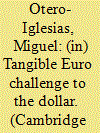

|
|
|
|
|
| Publication |
2012.
|
| Summary/Abstract |
The main purpose of this article is to shift the dollar vs Euro debate away from US-EU centrism to perspectives from emerging markets. Drawing on 40 semistructured financial elite interviews in Brazil and China, the key research question studied here is whether the US dollar is malfunctioning as the leading international currency in these parts of the world, and, if so, whether the Euro can be an alternative to the greenback. The results show that the status of the dollar as the main anchor in the monetary system is seriously questioned among financial elites in China and Brazil. As yet, though, the Euro does not represent an alternative to the dollar because of its fiscal and political fragmentations. However, despite these institutional shortcomings, the European currency is seen as an ideational role model for super-sovereign monetary integration out of dollar unipolarity based on consensual negotiations not only on a regional, but also on a global scale.
|
|
|
|
|
|
|
|
|
|
|
|
|
|
|
|
| 2 |
ID:
111592
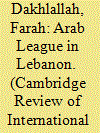

|
|
|
|
|
| Publication |
2012.
|
| Summary/Abstract |
Contrary to expectations, the Arab League has emerged as an active player in the Middle East region over the past decade. The League's roles in negotiations to end the 2006 Israel-Lebanon War and in the brokering of the 2008 Doha Agreement between warring Lebanese factions present two instances of 'partial' and 'direct' contributions to success in resolving major extra-systemic and minor internal conflicts. These developments are part of a global trend of the regionalization or decentralization of security in the post-Cold-War context.
|
|
|
|
|
|
|
|
|
|
|
|
|
|
|
|
| 3 |
ID:
111594
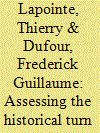

|
|
|
|
|
| Publication |
2012.
|
| Summary/Abstract |
This article reassesses what is at stake in the historical turn in international relations (IR) and the attendant debate between the Second Wave of neo-Weberian historical sociology (WHS) and Political Marxism (PM). Firstly, it endeavours to recast what is at stake in the 'historical turn' in IR: the critique of reification and chronocentrism. Secondly, it examines WHS's argument against reductionism in the light of Weber's own work. We show how the Weberian dualism between the politics and the economics inhibits its capacity to complete its project of historicizing IR. Finally, it explains why recent Weberian's defence of multicausalism creates even more obstacles on the road towards an ontologically consistent historical turn.
|
|
|
|
|
|
|
|
|
|
|
|
|
|
|
|
| 4 |
ID:
111590
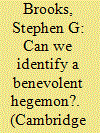

|
|
|
|
|
| Publication |
2012.
|
| Summary/Abstract |
Analysts frequently assess the underlying character of the state with the largest concentration of material capabilities in the system-the hegemon. Scholars typically differentiate a hegemon that is benevolent from one that is predatory. In the current era, many have wondered about how to best characterise the United States. Scholars became particularly interested in this question during the George W Bush administration and reached strikingly different answers. This article aims to provide greater clarity regarding how we reach a judgment about the underlying character of a hegemon, in general, and the United States, in particular. The first section analyses the policies that the hegemon adopts towards the global economic system. The second section considers the hegemon's policies in the security realm, focusing on the key issue of how unilateralism should be conceptualised. The final section discusses the potential significance the 'hegemonic reference point'-that is, the comparison that is made between the hegemon and the leading alternative leader of the global system.
|
|
|
|
|
|
|
|
|
|
|
|
|
|
|
|
| 5 |
ID:
111596


|
|
|
|
|
| Publication |
2012.
|
| Summary/Abstract |
This article elaborates the notion of 'nuclear idiosyncrasy' as a specific understanding of what nuclear weapons and energy are, what they stand for and what they can do. It then assesses the persistence of nuclear idiosyncrasy over time and its effects on French nuclear policies in the United Arab Emirates (UAE) and Iran. Based on interviews in France, Geneva and the UAE, this article contributes to three debates within foreign policy analysis and nuclear history. Is a regional approach necessary to understand the framing of foreign policies in the twenty-first century? Does a change in leadership fundamentally affect the orientations of nuclear policies? Are the risks of nuclear proliferation in the Middle East and the measures to prevent it similarly understood by all the players in the international community? First, it shows that French nuclear policies in the Middle East are not shaped by dynamics specific to the region as the often invoked notion of an 'Arab policy of France' would suggest. Secondly, in-depth analysis leads one to reject the idea of a major change between the nuclear policies of Presidents Chirac and Sarkozy. Thirdly, persistent French nuclear idiosyncrasy leads also to rejection of the idea of convergence towards a shared understanding of the proliferation threat in the Middle East.
|
|
|
|
|
|
|
|
|
|
|
|
|
|
|
|
| 6 |
ID:
111589
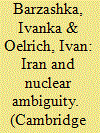

|
|
|
|
|
| Publication |
2012.
|
| Summary/Abstract |
A comparison between Iran's current nuclear efforts and those of the pro-Western regime of Shah Reza Pahlavi shows that Iranian ambitions for a full-fledged civilian nuclear programme have remained relatively constant for nearly half a century. Today, fuel cycle technology provides Iran with a latent nuclear weapon's potential. However, US concerns about an Iranian bomb, which began in the early 1970s and aggravated after the Iranian Revolution, long predate Teheran's uranium enrichment programme. Thus, Iran is a specific case of the general problem presented by the inherent potential of nuclear technology to both civilian and military ends. Approaches to dealing with a long-term, ambiguous, latent nuclear weapon threat, whether Iranian or other, are suggested.
|
|
|
|
|
|
|
|
|
|
|
|
|
|
|
|
| 7 |
ID:
111591


|
|
|
|
|
| Publication |
2012.
|
| Summary/Abstract |
This intervention argues that Bromley's account of American power underplays some of the structural weaknesses in the US-made liberal order. These weaknesses are not principally the result of relative economic decline, but chiefly the product of a political insistence among US ruling classes in getting their own way (that is, for the immediate American interests to prevail) regardless of their longer-term socio-economic or political consequences. It is the quest for American primacy, not the pursuit of a liberal international order that is the chief driver of US external relations. Likewise it is the more volatile dynamics of class antagonism and alliances both within and outside the USA-not the rational calculation of states as Bromley suggests-that tend to determine the success or failure of American primacy. I flesh out these claims by looking successively at the ideology of post-war American Empire, the contradictions of its actual implementation and the forms of socio-economic and political instability it generates. Bromley's sanguine view of the future of liberal order, it is argued, is only persuasive with a very narrow, inter-statist conception of world order and one which therefore underestimates the social origins of geopolitical disorder.
|
|
|
|
|
|
|
|
|
|
|
|
|
|
|
|
| 8 |
ID:
111593
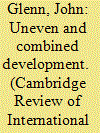

|
|
|
|
|
| Publication |
2012.
|
| Summary/Abstract |
Although Justin Rosenberg's academic writings have from the very beginning attempted to provide an alternative to neorealism in the form of Trotsky's theory of uneven and combined development (U&CD), his attempts at actually replacing it with a general theory of his own have been relatively recent. His initial attempts raised much interest and several responses. In his latest paper, 'Basic problems in the theory of uneven and combined development, part II: unevenness and political multiplicity' (Cambridge Review of International Affairs, 23:1, 2010, 165-189), Rosenberg acknowledges that in actual fact, despite his attempts to provide an alternative to neorealism, his own theory presupposed political multiplicity, and therefore in his latest article he has sought to rectify this by providing an account of the emergence of 'politically fragmented space' which is explicitly grounded in historical materialism (Pozo-Martin, Cambridge Review of International Affairs, 20:4, 2007, 554). As such, it is to be welcomed. However, this article argues that if we are to accept Rosenberg's theory of the emergence of multiplicity then it must provide a better explanation than other competing accounts. By using an alternative explanation of the rise of the international, this article demonstrates that Rosenberg's paper has failed to do this, and instead argues for the existence of a transhistorical anarchic environment arising from social rather than political multiplicity. However, U&CD is then used to explain both the intra- and inter-societal stratifications (the latter in terms of distributional structure) that arise. Associated with these stratifications is the inextricable intertwining of the modes of production and modes of inter-state competition. From this combination emerges the general tendencies of societal development, which then need to be applied to the concrete circumstances of history. In so doing, we need to account for the different analytical registers of genesis, structure, epoch and conjuncture and the unique concatenation of factors that pertain for each of these (Callinicos, International Politics, 6:3, 2005, 362).
|
|
|
|
|
|
|
|
|
|
|
|
|
|
|
|
|
|
|
|
|